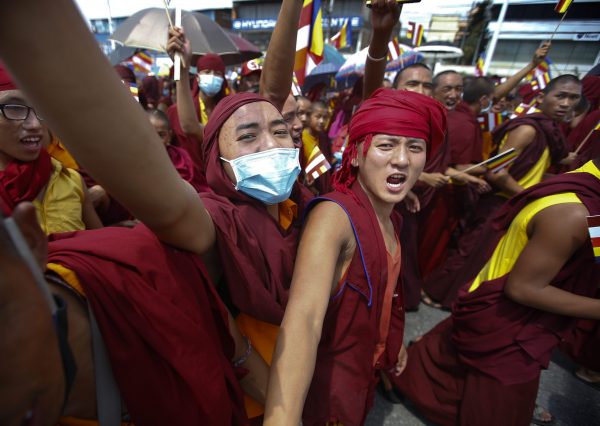As the draft of a new constitution is being finalised, a number of Hindu groups and religious leaders are demanding that the country again be declared a Hindu state. Prominent Hindu groups have been organising rallies in various cities around the country demanding the restitution of the Hindu state in the new constitution. A nationalist party, Rastriya Prajatantra Party Nepal, has also been demonstrating in numerous cities demanding a Hindu state and the removal of the term ‘secular state’ from the draft constitution.
Some mid-level figures in the Nepali Congress and the Communist Party of Nepal (United Marxist Leninist) are also opposed to a secular state identity, demanding the inclusion of ‘religious freedom’ instead of ‘secular state’ in the new statute. Demands to retain a Hindu state seem to be an effort to stop proselytisation by Christian missionaries and the slaughter of cows in Nepal. It has even been reported that some Muslim leaders appear to support the Hindu state identity, arguing that the country’s present secular status has increased insecurity for their communities.
On the other hand, non-Hindu groups like the Nepal Buddhist Association, and numerous hill indigenous groups (i.e. non-Hindu Mongolian communities), including Nepal Federation of Indigenous Nationalities, and Muslims groups have repeatedly argued that a religiously and culturally diverse country like Nepal should remain an unambiguously secular state not just one that endorses ‘religious freedom’. An individual’s right to religious freedom is guaranteed as a fundamental right in Article 23 of the Interim Constitution. This clause will be retained in the new constitution, so there is no need to replace the term ‘secular state’ with another one such as ‘religious freedom’.
Analysis of recent opinion polling conducted in Nepal supports the view that there should be no official association between the state and a particular religion. Although the majority of Nepali people still want Nepal to be a Hindu state (this is not surprising since more than 80 per cent identify as Hindus), a significant proportion of Nepalis wish to see their country as a secular state. A strong preference for a secular state is evident at some sub-national levels.
The proportion of those who support secularism is also very significant among certain groups of the population such as Buddhists, Muslims, Kirati, Christians, hill indigenous groups, and supporters of most of the Communist parties. The Nepali state’s official association with Hinduism is not universally accepted. The majority of Buddhists and Muslims, as well as the Kirati and Christian populace, want Nepal to be a secular state. Neither Buddhist nor Muslim peoples have pushed for Nepal to be a Buddhist or an Islamic state. Hindu groups demanding that the Hindu state be reinstated simply because Nepal is a Hindu-majority country are misguided.
Further analysis of the survey data shows that supporters of republicanism and federalism are more likely to support secularism, while supporters of a monarchy and a unitary state are more likely to support a Hindu state. Therefore, Nepal’s disassociation from secularism may lead to a weakening of the country’s other new structures — republicanism and federalism — which are pillars of an inclusive democracy. This further justifies moves to link the Nepali state’s identity to secularism.
Some Hindu groups and religious leaders appear to be promoting a return to a Hindu state because secularism, unlike republicanism and federalism, is the only state restructuring issue they can attack. Nepali society has changed a lot in the last eight years. There is no going back to the structures of the old state. Demands for returning Nepal to a monarchical unitary state are simply a pipe-dream.
An inclusive democracy should accommodate the views of minorities and not just the majority. If a country is constitutionally secular, religious minorities can also feel a sense of ownership of the constitution and enjoy equal freedom. It is crucial that those responsible for drafting Nepal’s new constitution recognise the voices of the entire spectrum of the Nepalese people, not only the Hindu majority. This will not only guarantee an inclusive democracy, but also will make the entire populace, including its minorities and marginalised peoples, true owners of the constitution.
Pawan Kumar Sen is a PhD candidate in Political Science, Leiden University, the Netherlands.

